
Want to know all the information you need to write two great essays and ace the TOEFL Writing section?
This guide has all the tips you need to do well on TOEFL Writing. We’ll explain exactly what you can expect to see in this section, then give TOEFL Writing tips tips on how to answer both essay types, how you should study, and what you should do on test day to make sure you ace this section.
Overview of the TOEFL Writing Section
The TOEFL Writing section lasts 50 minutes and contains two tasks: Integrated Writing and Independent Writing. It’s the final section of the TOEFL. After this, you’re done!
You’ll have 20 minutes to plan and write the Integrated Writing Task and 30 minutes to plan and write the Independent Writing Tasks. Both essays will be written on the computer. We’ll discuss the tasks and what you’re expected to write in more detail in the next section.
After you complete the exam, your essays will be graded by several (typically four) graders. Each essay will receive a score from 0-5. The sum of those two scores will then be scaled to a score from 0-30, which is your official Writing score. The Writing section makes of 25% of your total TOEFL score (from 0-120).
What Types of Questions Are on TOEFL Writing?
The Writing section contains two tasks. In this section, we’ll explain the format and content of the tasks and give an official example question and response tips for each question type.
By the way: we have built the world's best online TOEFL course. Get online practice (TPO-sytle!) and individual grading and feedback on Speaking and Writing.
To be fair, it's possible to get a good TOEFL score studying alone. But PrepScholar is the world's most effective TOEFL course if you are worried about the TOEFL and are struggling to improve your score.
Learn how you can improve your TOEFL score by 15 points today.
TOEFL Integrated Writing
The TOEFL Integrated Writing task requires you to use listening, reading, and writing skills. For this task, you will have three minutes to read a short passage, then you will listen to a short (approximately two-minute long) audio clip of a speaker discussing the same topic the written passage covers. You will have 20 minutes to plan and write a response that references both of these sources. You won’t discuss your own opinion.
During the writing time, you’ll be able to look at the written passage again, but you won’t be able to re-hear the audio clip. You’ll be able to take notes while you listen to it though. The suggested response length for this task is 150-225 words. You’ll be graded on the quality of your writing as well as how well your response represents the main points of the audio clip and written passage and how they relate to each other.
Want to learn more about Integrated Writing? Watch this short clip below:
Sample TOEFL Integrated Writing Question
(On the real TOEFL, the lecture would be an audio clip instead of a transcript.)
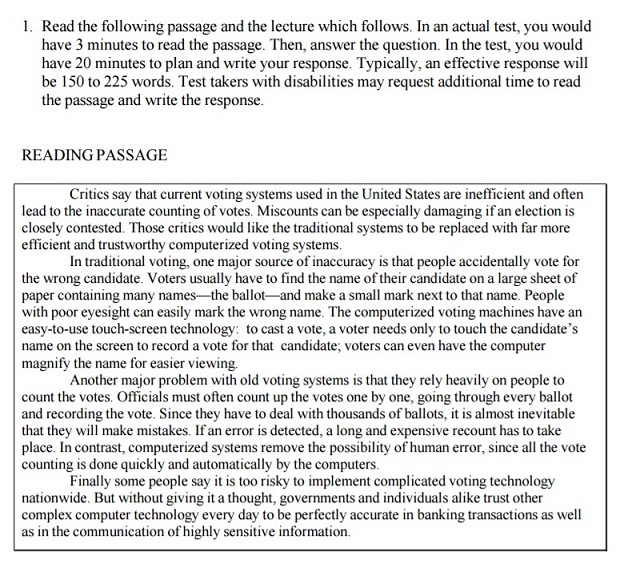
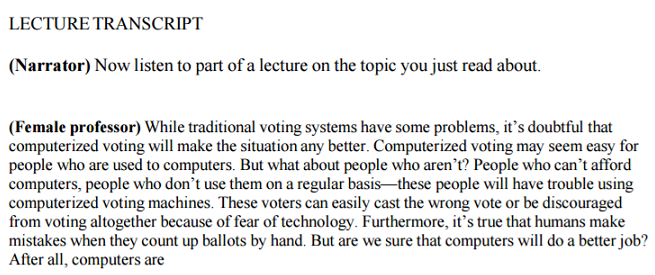
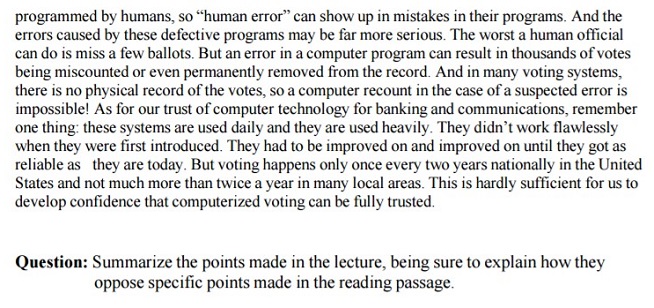
TOEFL Writing Tips for Answering
- Frequently refer back to the audio clip and written passage when making an argument. A key part of your grade is how well you show you understood the information these two pieces contained.
- However, don’t just copy portions of the audio clip or passage into your essay; that doesn’t show your English skills. Always rewrite the main ideas in your own words.
- When answering this question, pay careful attention to any differences between the information in written passage and the information in the audio clip. These differences are often an important part of your response.
- Take good notes when the audio clip is playing. You won’t have an opportunity to listen to it again.
- Don’t inject your own opinion. Only discuss what the audio clip and passage are saying. You’ll only discuss your own opinion on the Independent Writing Task.

TOEFL Independent Writing
For the Independent Writing task, you’ll receive a question on a particular topic or issue. You’ll have 30 minutes to plan and write a response to that topic that explains your opinion on it. You’ll need to give reasons that support your decision.
It’s recommended that your response to this task be at least 300 words, and you’ll be graded on how well you develop your ideas, how well your essay is organized, and how accurately you use English to express your ideas.
What to learn more about TOEFL Independent Writing? What this video:
Sample TOEFL Independent Writing Question
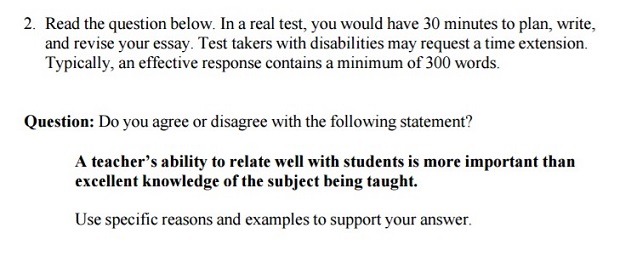
TOEFL Writing Tips for Answering
- Don’t be afraid to make things up. This essay is all about creating a strong argument for your opinion on a topic. If you don’t really care about the topic you’re supposed to write about, choose whichever side you can write a stronger essay for, and act like that’s your opinion.
- Make your opinion clear within the first paragraph of your essay. There should be no doubt as to how you feel about the topic.
- Longer isn’t always better. The minimum recommended length for this essay is 300 words. If you have spare time and points you still want to make, keep writing, but don’t feel like your essay needs to be 600 words. Aim for your essay to be at least 300 words, but if it’s only, say, 320 words, it’s still possible for it to get a top score if you’ve written it well.
TOEFL Writing Study Strategies
You should absolutely study the TOEFL Writing section and do practice essays before exam day. Below are some tips to help you get the most out of your studying.
Study Strategy 1: Study the 2 Essay Types
The two essays you need to write for this section are more different than they may appear at first glance, and it’s important to be aware of those differences to understand how to get top scores for both essays.
For the Integrated essay, you should not give your own opinion on the topic, and you’ll need to refer to specific points in the audio and written passages to back up your claims. For the Independent essay, you will have to give your own opinion, along with specifics to back it up.
Completing practice essays will help you become more familiar with what the prompts will look like (see next section), and you should also look at the rubrics TOEFL graders will use when grading your essays so you get a better understanding of what you need for a high score.
Study Strategy 2: Take TOEFL Writing Practice Essays
Any writing you do in English can help strengthen your skills and help you do better on TOEFL Writing, but it’s especially important to take practice TOEFL essays. Completing practice essays will help you become more familiar with the different essay prompts, strengthen your writing skills, and learn how to manage your time when writing essays.
We have a guide to all the best TOEFL Writing practice resources, including numerous free and official practice essays. Check it out to get some great study materials for the Writing section.
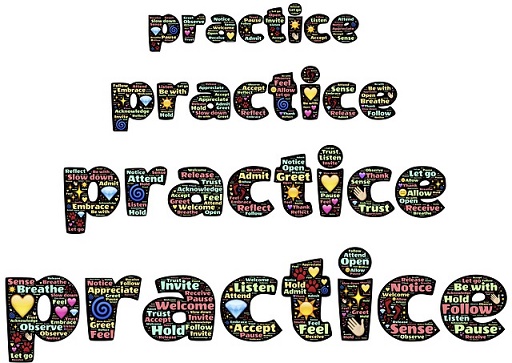
Study Strategy 3: Time Yourself When Writing Practice Essays
When you’re doing practice essays, you should also be sure to time yourself. Give yourself 20 minutes to plan and write an Integrated Writing essay and 30 minutes to write an Independent Writing essay.
Timing yourself when you write will help you be more prepared for test day since you’ll get practice planning and writing essays within a limited time frame. When you first start writing your practice essays, it can be easy to spend too much time preparing which will cause you to run out of time before you finish writing. Completing timed practice essays will help you avoid this.
You should also count how many words your essays contain after you’ve finished writing them. Integrated Tasks should be 150-225 words and Independent Tasks should be at least 300 words.
Want to improve your TOEFL score? We have the world's leading TOEFL course.
Built by world-class instructors from Harvard and MIT, the course offers individual review, interactive lessons, and realistic online praactice, at an affordable price! It's the fastest way to get your target TOEFL score.Study Strategy 4: Review Your TOEFL Writing Practice Essays
After you write each practice essay, you should also review it and think about how well it answered the question. This is easier to do if the practice question comes with sample answers that you can compare your answer to, but you should do this step for all practice essays you write, even if they don’t come with any answer explanation. You can also assign your essays a score or have a tutor or friend who’s also studying for the TOEFL score your essay.
It’s tempting to take a break from TOEFL studying as soon as you’ve finished your essays, but it’s important to do this step because it will get you thinking about what great essays look like and how yours can be improved.
TOEFL Writing Tips for Acing the Section on Test Day
The last step in acing TOEFL Writing is having a great exam day. Follow these TOEFL writing tips to help ensure everything goes smoothly while you’re completing the Writing section.
Test Tip 1: Take a Few Minutes to Plan Your Essays
Since you only have a limited amount of time to complete your essays, it can be tempting to start writing the second your time starts. You want to avoid doing this, however. Spending just a few minutes planning your essay can help keep your writing focused and on topic, and it can often help you write faster because you know what you’ll be discussing next.
Spend a max of two to three minutes writing a basic outline for your essay. It should include:
- Your thesis statement (the main point you’re making and will discuss throughout the essay)
- The main point of each paragraph you’ll have in your essay
- Any specific examples you can quickly think of (either from the included passages or your own opinion, depending on the essay) to back up your claim
Before you begin writing, reread the essay prompt again to make sure your outline answers the question well (see next section for more details).
Test Tip 2: Keep Referring Back to the Question
Even if you craft a beautiful essay with perfect English, you won’t get a good score if you don’t answer the question properly. It can be easy to go off on a tangent or begin to discuss something other than what the question is asking.
For example, the Independent Writing sample question above asks you to explain whether it’s more important for teachers to relate well to students or have excellent knowledge of the subject they’re teaching. In your essay, you might include an example of a great teacher you had and spent the majority of the essay explaining why that teacher was your favorite. Even if your writing is flawless, you wouldn’t get a good score because you’re not discussing the question the essay prompt is asking.
This is something practice and making an outline before you begin writing can help you avoid, so be sure to do both, and remember to reread the prompt as you write your essay to make sure you’re on track.

Test Tip 3: Leave Some Time to Review Your Essays
After you’ve finished writing your essay, it’s helpful if you can spend a little bit of time looking it over. Even setting aside 60 seconds can give you enough time for you skim your essay and catch and spelling or grammar errors or any sentences that aren’t clear. Fixing these little mistakes can help you from losing points when your essays are scored. Doing practice essays will help you get better at managing your time so it’ll become easier to finish your essays with some time to spare for reviewing.
Acing TOEFL Writing: What You Need to Know
In order to do well on the TOEFL Writing section, it’s important to first learn exactly what types of essays you’ll be expected to write, what they should include, and how you’ll be graded on them. While you’re studying for this section, be sure to study the two essay types, take practice essays, time yourself when writing essays, and review your practice essays.
On exam day, during the Writing section you should outline your essays before you begin writing, refer back to the essay prompts regularly, and leave yourself a bit of time at the end to review what you’ve written. Keep these TOEFL Writing tips in mind, and you’ll be well on your way to writing great essays. And remember, this is the last section of the TOEFL. Once you finish the Writing section, you’re done!
What’s Next?
Not sure what TOEFL score you should be aiming for? Learn what a good TOEFL score is based on the schools you’re interested in.
Want more tips on how to prepare for TOEFL Writing questions? Check out our guide to the best ways to practice for TOEFL Writing!
Once you’ve taken the TOEFL, how do you send your scores to schools? Learn the six tips you need to know for sending your TOEFL Scores.
Ready to improve your TOEFL score by 15 points?
Download our best TOEFL Strategy eBook (valued at $14.49) for FREE! Learn the top 5 strategies you must know to improve your TOEFL score. Download it for free now:

Comments are closed.